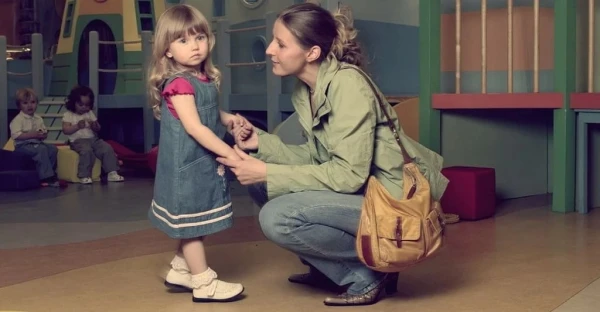
Tears, illnesses, and parental guilt — this is how many experience adaptation to kindergarten. Together with a psychologist and pediatrician, we will try to make this process as comfortable as possible for all family members.
At What Age Should a Child Start Kindergarten
By the age of three, additional systems in the brain are formed that help cope with stress. However, it is important to look not at the calendar but at the specific child. Some children easily engage with unfamiliar adults and quickly adapt at two years old. Others may still hide behind their parents when meeting new people at four.
It’s great if your child is ready for kindergarten if they:
-
can eat independently with a spoon;
-
uses the potty/toilet;
-
can partially dress/undress themselves;
-
plays alongside other children;
-
can spend two to three hours without parents;
-
engages with unfamiliar adults;
-
wakes up around 8:00 AM;
-
has breakfast between 8:00–8:30 AM;
-
goes to bed before 9:30 PM.
According to attachment theory, it is better for a child to be with family until the age of three. But if parents see that their child is sociable, gets along well with others, and has an active personality, they can consider starting kindergarten earlier.
How to Prepare for Kindergarten in Advance
Establish a Routine
Gradually shift the wake-up and bedtime. The home diet should resemble that of the kindergarten so that the child knows what porridge or casserole is.
Not all children can adapt to daytime naps. In such cases, consider private kindergartens or discuss quiet time without forcing sleep with the caregiver.
First and foremost, it is essential to establish a routine similar to that of the kindergarten. It is important to minimize stress, as its intensity will affect the frequency of illnesses.
Encourage Independence
There may be twenty to thirty children in the group. While each child is being dressed, all the others will be standing in hot changing rooms, sweating, and then going outside wet. Therefore, it is important to teach the child basic self-care skills in advance.
Dream About Going to Kindergarten
Read books about kindergarten, play “kindergarten” with toys, tell positive stories, and walk near the chosen institution. It is important for the child to want to go to kindergarten in advance.
How to Go Through Adaptation with Minimal Tears
Start with Short Stays
A sudden transition from home to a full day at kindergarten is stressful. If possible, stay with your child at the kindergarten for three to four hours during the initial adaptation period. The child will feel calm while getting familiar with the environment. Then leave for the same amount of time for errands. Only then transition to a full day.
Say Goodbye Quickly
After the period of staying together, it is important to learn how to say goodbye properly. Parents think they are helping the child by staying with them until they calm down. In reality, this only increases stress. Clearly state the time of departure and do not prolong the goodbye. While the child is crying and you are sitting with them, cortisol is produced. As soon as you leave, the child will try to adapt to the situation.
Strengthen Immunity
Monitor the child’s hydration, give them vitamin D, and ensure a balanced diet. After kindergarten, it is beneficial to rinse the nose and mouth with boiled or filtered water: this helps wash away possible viruses. Don’t forget about proper handwashing — the most effective protection against infections.
Oxolinic ointment is useless: it glues the cilia of the nasal epithelium and only facilitates the entry of viruses. It is better to regularly irrigate the mucosa with a saline solution.
Establish Home Rituals
Morning rituals set the tone for the entire day. Wake up at a specific time even on weekends, get ready without rushing, and create a positive atmosphere — talk about what interesting things will happen at kindergarten. Come up with a special goodbye ritual with the same phrase: this will give the child a sense of stability.
In the evening, be sure to discuss how the day went: what they liked, who they played with, what was difficult. Let the child express themselves, even if it seems they are repeating themselves. Communicate: it is not necessary to entertain the child every minute; simply being nearby, playing simple games, or cooking dinner together is enough. Ensure a calm bedtime at the same time.
The main thing in communicating with the child is not to devalue their feelings. Instead of saying, “Don’t cry, kindergarten is good,” say, “I understand you’re sad. That’s okay.” And always provide specific information: “I will pick you up after the walk.” This way, the child receives both support and clarity.
How Long Does Adaptation Last and When to Seek Help
Getting used to kindergarten can take from a week to six months. The duration depends on the child's personality type, social skills, family situation, and conditions at the kindergarten. Active, sociable children adapt faster than slow and shy ones.
You should consult a psychologist if, after a month, the child still refuses to go to kindergarten or if regressive behaviors appear (such as bedwetting, speaking like a baby, etc.). Warning signs include serious sleep and appetite disturbances, aggressive behavior, or complete apathy, as well as constant tantrums.
Even if your child did not have a perfect adaptation, it is not a disaster. Many people grow up completely happy despite difficulties in kindergarten.













